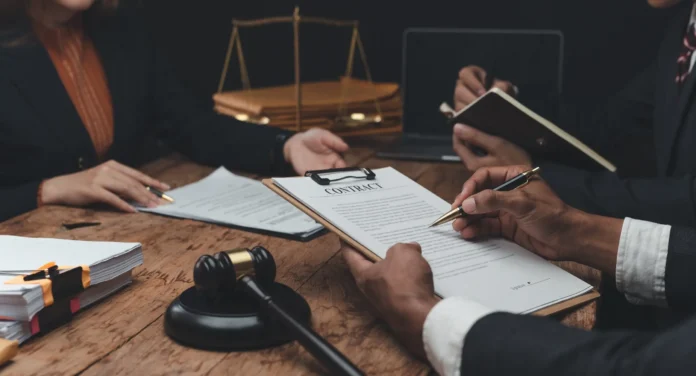Enduring the loss of a loved one can be an overwhelming experience, let alone when the circumstances surrounding the death are due to another party’s negligence. In these instances, pursuing a wrongful death lawsuit can provide some measure of solace and monetary compensation for grieving parties. However, the process may appear daunting to the uninitiated. This guide aims to demystify the step-by-step procedure involved in filing a wrongful death lawsuit, illuminating every stage of this intricate legal journey.
Hiring an Attorney

Venturing into the legal maze of wrongful death lawsuits, the initial stride calls for securing an adept attorney. The realm of wrongful death claims teems with complexities that necessitate specialized knowledge and experience. Thus, it becomes imperative to engage Atlanta Wrongful Death Lawyer who has demonstrable expertise in the field. Furthermore, seeking legal counsel early in the process ensures that you meet statutory deadlines, prepare your case efficiently, and navigate the intricacies of the lawsuit.
Beyond legal expertise, you should also look for an attorney with whom you feel comfortable sharing sensitive details and communicating openly. Evaluate their track record, reputation, and responsiveness to make an informed decision. Remember, your choice of counsel can profoundly influence the trajectory of your case. Hence, ensure that your selection aligns with your needs, facilitating a seamless process and increasing your chances of securing a favorable outcome.
Gathering Necessary Documentation

Following the recruitment of an attorney, you’ll commence the task of assembling requisite documentation. Your attorney will guide you through the specifics, which typically include medical records, autopsy reports, and other evidence that establish the cause of death. This documentation will provide a foundation for your claim, as it is essential to illustrate how the defendant’s actions, or lack thereof, led to your loved one’s death.
The next order of business involves producing evidence of financial loss. Wrongful death claims often hinge on the concept of monetary damages, making it crucial to document the financial impact of your loss. These could comprise lost wages, future earning capacity, funeral costs, and other expenses related to the deceased’s contribution to the family. By meticulously amassing this evidence, you bolster your chances of a successful claim.
Identifying the At-Fault Party or Parties
A pivotal step in the wrongful death claim process involves identifying the responsible party or parties. Your legal team will launch an investigation to determine who should be held liable for your loved one’s death. This task requires a discerning analysis of the circumstances surrounding the death and careful consideration of who had a duty of care toward the deceased.
Multiple parties can be held accountable in certain situations. For instance, in a trucking accident, the driver, the trucking company, or even the vehicle manufacturer could bear responsibility. This aspect of the case underscores the need for a comprehensive investigation and effective legal counsel, which ensure that all liable parties are held accountable.
Initiating the Lawsuit

Having identified the at-fault parties, you’ll be primed to initiate the lawsuit. Your legal counsel will draft a ‘complaint’ – a legal document that outlines your allegations identifies the defendant(s), and specifies the damages you seek. The complaint effectively launches your lawsuit and sets the tone for the impending legal proceedings.
Once the complaint has been thoroughly prepared, it is then filed with the appropriate court. This process is subject to specific rules and deadlines, which your attorney will navigate skillfully to avoid any pitfalls. Following the successful submission of your complaint, the lawsuit is officially underway, propelling you one step closer to achieving justice.
Serving the Legal Complaint
Post filing, the defendant(s) must be formally notified of the lawsuit through a process known as ‘service of process.’ This involves delivering a copy of the complaint and a ‘summons’ – a document that notifies the defendant of the lawsuit and explains their obligation to respond. For service to be effective, it must adhere to specific rules and procedures, thereby underlining the importance of professional legal assistance.
It’s worth noting that failure to properly serve the defendant could potentially derail your lawsuit. Therefore, it’s prudent to entrust this critical task to your attorney or a professional process server. By ensuring accurate service, you preserve the integrity of your lawsuit and prevent any delays or complications that could thwart your quest for justice.
Responding to the Defendant’s Answer

Upon receipt of the complaint, the defendant is expected to submit a formal response, known as an ‘answer.’ This document outlines their defense, which may involve admitting or denying your allegations, or asserting affirmative defenses. Your attorney will meticulously examine the defendant’s answer to devise the most effective rebuttal.
It’s crucial to note that the defendant’s answer can significantly shape the course of the lawsuit. Consequently, crafting a potent response requires strategic legal expertise. Your counsel will counter the defendant’s arguments with compelling evidence and legal reasoning, ensuring your claim remains robust against any defensive tactics employed.
Discovery Phase and Evidence Collection
With the defendant’s answer on the record, the case enters the ‘discovery phase.’ This is a crucial stage in the lawsuit where both parties exchange information and gather evidence in support of their respective cases. Your attorney will employ various discovery tools, such as interrogatories, document requests, and depositions, to uncover valuable insights into the defendant’s case.
While this phase can be time-consuming, it is instrumental in preparing for trial or settlement negotiations. Your attorney’s skill in navigating the discovery process and their ability to extract pertinent information can significantly impact the strength of your case. Rest assured, the information gathered during discovery can serve as powerful ammunition in your pursuit of justice.
Depositions and Witness Testimonies

One of the most effective tools in the discovery process is the deposition. This entails the oral questioning of parties, witnesses, and experts under oath. Depositions provide an opportunity to gauge the strength of the defendant’s case and gather potentially incriminating evidence.
Witness testimonies are another valuable resource. By identifying and interviewing individuals who were privy to relevant events or facts, you can strengthen your case substantially. Therefore, proper management of depositions and effective use of witness testimonies can significantly enhance your prospects for a favorable outcome.
In Closing
Embarking on a wrongful death lawsuit can be a formidable endeavor, fraught with legal intricacies and emotional trials. However, by enlisting the right legal assistance and understanding each stage of the process, you can navigate this challenging landscape with greater confidence and clarity. As you tread this path, may this guide serve as a beacon, illuminating your pursuit of justice in memory of your loved one.









